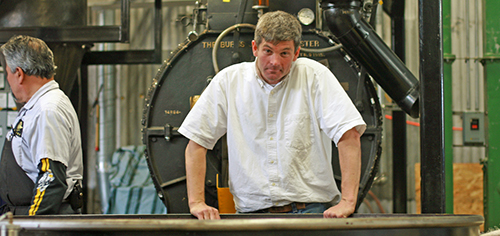This article originally appeared on Sheepless.org
As easy as it was to schedule a meet up with Cafe Moto owner Torrey Lee, it's much harder to pin down a description of his business. The list includes solar power, social responsibility, sustainable agriculture, local distribution, and community involvement -- though none of these are core principles per se, and they're more than just good business decisions. They involve decisions that he can, and does, feel good about.

Cafe Moto's story is older than Torrey himself, and goes back to his step-father's small shop in La Jolla, CA. Pannikin sold cookware, food, and wine--things his step-father himself liked. But when he started using the shop's small peanut roaster to craft coffee for his customers, it set in motion the slow evolution towards the wholesale coffee warehouse Cafe Moto occupies in San Diego's Barrio Logan district today.
By the time Torrey started his first job as a dishwasher at Pannikin, the business had grown to six cafes throughout the area. It was there he got a crush on the 'punk hipster coffee girl' behind the counter, who would become his wife and co-owner. Torrey says that he eventually went on to work nearly every possible job in the company, from dishwasher to roaster to management, so it's fair to say he has an idea of what he's asking each of his employees to do.
Following the success of several Seattle coffeehouses in the late 1980s, the family was getting frequent requests and franchising offers to open more storefront cafes, but it started to feel like a business that they didn't want to run. They liked running a small operation, not managing "a 500 store chain". They eventually decided to create a small wholesale coffee brand, and sell off the Pannikin brand--the retail cafe side of the business (they actually hired a consultant who ended up having so much faith in the business that he bought it himself). By this point, Torrey's parents were ready to move on to something else, and turned to Torrey to buy the wholesale coffee side off of them, as well. In 1998, he and his wife Kim borrowed money to buy what was left of the family business, and the new history of Cafe Moto began.
The first thing they did was move the operation from a set of small disjointed buildings in a high rent district into a pair of warehouses ("weird buildings," Torrey calls them) in Barrio Logan, a scrappy industrial post-seaport neighborhood where room to experiment was not a problem. The structures were joined under a cheap and efficient roof of spray foam and corrugated metal. It was at this point that he first looked into adding solar panels and went as far to get an estimate from a local contractor, which turned out to be massively prohibitively expensive. Then he came across Solar Power Partners, who offers a unique 'Power Purchase Agreement'--basically Torrey leases his roof to the solar energy company who installed 105 panels and the necessary monitoring and electrical equipment, under the agreement that Cafe Moto would buy its energy from them at a rate lower than the local utilities company. It's a remarkable move on everyone's part, one that saves money and environmental impact for Cafe Moto, and is a conscientious and solid investment on behalf of the owners of the solar panels on his roof.
Torrey explains that decisions like this come from an awareness of the world he is creating--and the example he is setting--for his two young daughters. The beauty of staying small and privately owned means he can make choices like this, that benefit people even if not directly profitable.
This approach also explains Cafe Moto's involvement with a small women's farming collective in Nicaragua called Las Hermanas ("The Sisterhood"). While the coffee is both certified organic and Fair Trade, Torrey decided to purchase their crop and establish it as one of his best coffees due to its distinct, bold, outspoken flavor, before even labeling it or marketing its origins. The knowledge that the sliver of business that he can give the women allows them better care for their families, schools and uniforms for the children, and a new clinic for their community, was enough of a payoff. Today, all of Cafe Moto's organic coffees come from this cooperative.
As much as the business has grown over the past decade, it still very much has the feel of a small family-owned business. "I guess I don't know anything else," Torrey considers. They have a staff of about 20, who work to bring the beans to their customers in as short a time as possible. Buoyed by the healthy, sustainable food movements of recent years, Torrey knows his buyers and their drinkers demand and appreciate better coffee. Most of his customers, ranging from "5-star restaurants to taco shops" are in the immediate San Diego area, where they are able to make regular deliveries themselves, cutting the time from roast to cup to just two to three days. Roll in a company-wide recycling program, reclaimed building materials when possible, and hiring neighborhood contractors for any outside work needed, and you've got a business that Torrey's daughters will someday be proud of.